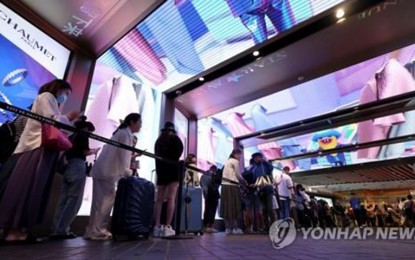
Foreign tourists at a duty-free shop in Seoul, South Korea on Aug. 11, 2023. (Yonhap)
SEOUL – South Korea will double the maximum limit of purchases eligible for an immediate tax refund by foreign tourists to 5 million won (USD3,831) next year to attract overseas visitors and bolster the tourism industry, the finance ministry said Monday.
Currently, the country provides on-the-spot tax refunds for an individual purchase of up to 500,000 won at designated stores, with a maximum cap being set at 2.5 million won on total payments.
"Starting Jan. 1, 2024, the maximum per-payment amount for tax refunds will be raised to 1 million won and the total to 5 million won," Finance Minister Choo Kyung-ho said during an emergency economy-related ministers' meeting.
"The move aims to promote foreign tourists' shopping here and to bolster the tourism industry," he added.
At departure halls, there are no restrictions on purchases eligible for tax refunds.
The number of visitors from overseas to South Korea more than quintupled from a year earlier to come to 4.43 million in the first half of this year following a sharp fall over the past couple of years due to the coronavirus disease 2019 (Covid-19) pandemic.
In 2022, the country saw around 3.2 million foreign tourists, compared with 17.5 million in 2019.
Earlier this month, Culture Minister Yu In-chon said the country seeks to attract 20 million foreign visitors by the end of next year, and the government will strive to create various content and programs for them.
Meanwhile, Choo called on the National Assembly to revise the Serious Accidents Punishment Act, which penalizes owners and management of companies for failing to fulfill their duties to prevent serious industrial accidents.
The Act, which took effect in January 2022, is currently applied to firms with 50 or more workers, and businesses with fewer than 50 employees are supposed to be subject to the regulation starting next year, though the government seeks a grace period for smaller entities.
"Small and midsized companies do not have the capabilities to be fully prepared for the act. I once again ask for the National Assembly's passage of the revision within this year so that smaller companies can have more time to be prepared for the regulation," Choo said, vowing additional measures to prevent industrial accidents and help boost smaller firms' safety management capabilities. (Yonhap)
